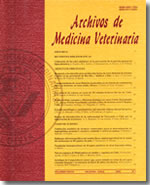Effect of a low selenium diet on the immune response to Brucella abortus strain RB51 vaccine in dairy cows
Main Article Content
Abstract
The effect of a diet with a low selenium (Se) content on the immune response to Brucella abortus Strain RB51 vaccine in dairy cows and in their serum inmunoglobulin concentrations was studied. Twelve pregnant Friesian cows (7 to 8 months) were randomly allocated into two homogeneous groups of six animals each. Animals were maintained during 6 months in individual cubicles with water ad libitum and a diet based on grass hay with a low Se content (0.02 ppm base on dry matter) and nutritionally balanced for other nutrients. One group was maintained only with the low Se diet (Se-D) and the other group (Se-S) was treated with barium selenate (1 mg Se/kg sc) 45 days before calving. All off the cows were immunized with Brucella abortus RB51 vaccine during the fourth month of the experiment. Blood samples were obtained before supplementation and thereafter every 15 days for determination of the GSH-Px activity in erythrocytes. Serum IgG, IgM and IgA concentrations were determined by the inmunodiffusion radial method. Anti Brucella abortus antibodies were determined by an ELISA technique. Cellular immune response to Brucella abortus antigen was evaluated by intradermic reaction test and histological analysis. Erythrocyte GSP-Px activity in the Se-D group decreased to deficient values (<60 U/g Hb) on day 150 of the experiment, while that in the Se-S group increased and remained within adequate values (>130 U/g Hb) during the entire experimental period. Serum concentrations of IgG, IgM and IgA were similar in both groups of cows and also there were no differences (P>0.05) in the humoral and cellular immune responses to RB51 vaccine. These results suggest that the use of a diet with a low Se content does not affect the humoral and cellular response to RB51 vaccine.

